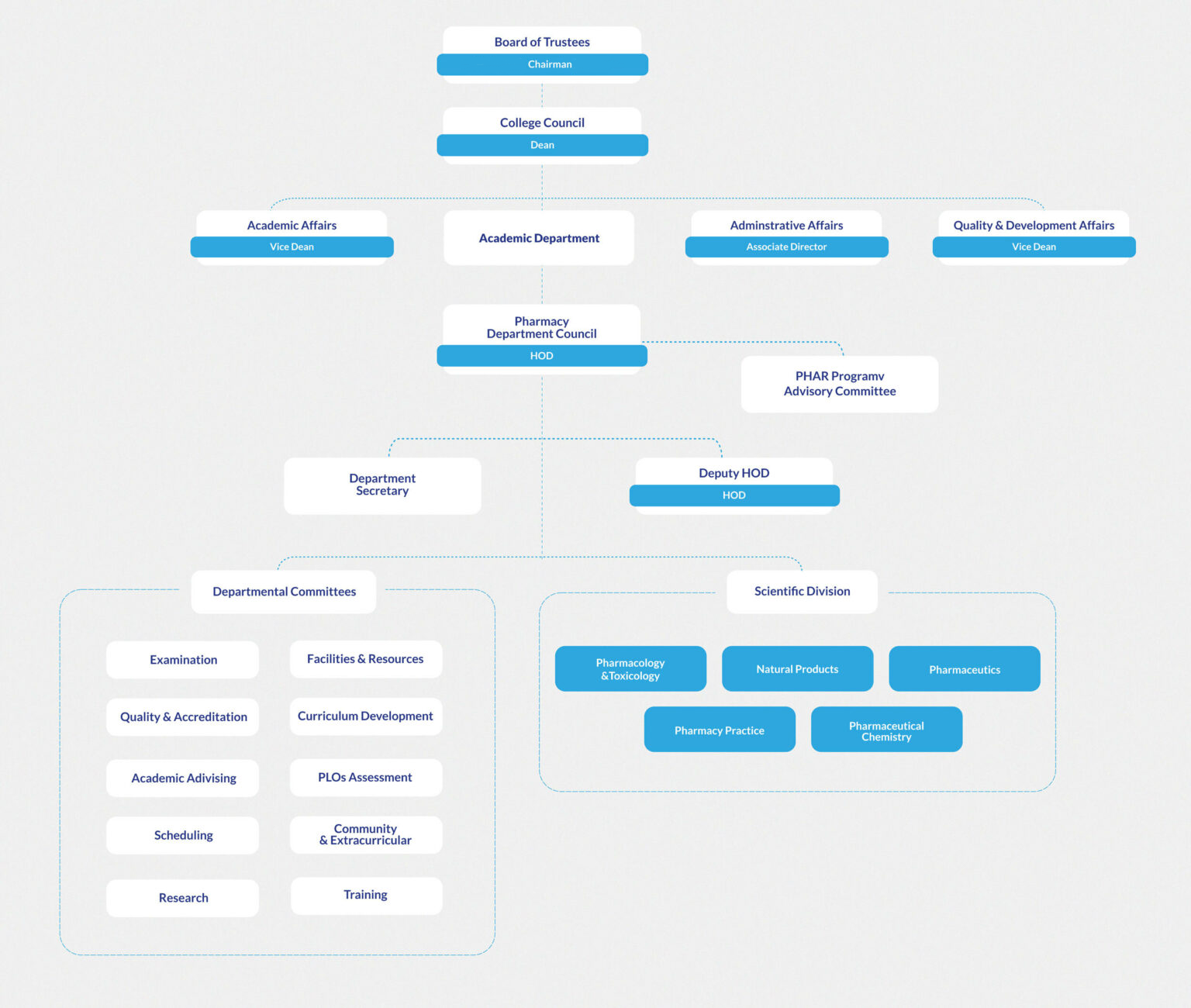Bachelor of Doctor of Pharmacy (Pharm D)

Vision
To be recognized as a leader for excellence in pharmacy education, renowned for research and service for communities.

Mission
To prepare pharmacy students with knowledge and skills to serve communities through the provision of patient-centered care and research.
Program
The Pharmacy Department at Mohammad Al-Mana College for Medical Sciences (MACHS) prepares students for positions in different latitudes of the Pharmacy profession. The Pharmacy education at MACHS lays the foundation for its graduates to work efficiently in the field of drug development and manufacture, quality control and quality assurance of pharmaceutical products and their marketing, community and hospital pharmacy, and research and academics. The graduates are also encouraged and supported in terms of career counselling and advice to pursue their studies in various disciplines of Pharmaceutical Sciences such as Pharmaceutics, Medicinal Chemistry, Natural Products, Analytical Chemistry, Design of Dosage Forms, Biopharmaceutics, and Pharmacokinetics.

Credit hours: 194 hours.
Years of study :
6 years (1 Year Foundation Year + 4 years Pharmacy program + 1 year internship).
2+X Global Health Program
2+X Global Health Program is incorporated in all MACHS five programs.
It is comprised of two years of unified courses in each program before students are introduced to their specialized courses.
The 2+X Global Health Program is attested by the World Education Services (WES), stating that the MACHS-taught component of the 2+X Global Health Program is equivalent of two full years of undergraduate study at a regionally accredited U.S. institution for the purposes of admission and transfer credit.
This allows students to transfer easily to other majors either within the college or internationally without the loss of credits.
Program Goals
- The goal of our Pharmacy program is to provide high-quality education and training that will produce competent Pharmacy graduates who are well-prepared for a successful career in the field
- Our college is committed to providing effective teaching to our students, which includes utilizing innovative teaching methods, hiring experienced and knowledgeable faculty, and ensuring that our curriculum is up-to-date and aligned with industry standards.
- The goal to achieve high students' satisfaction by providing a supportive and inclusive learning environment, offering quality academic programs and services, and continually seeking feedback from students to improve their overall college experience
Graduate Attributes
Knowledgeable
One of the key graduate attributes of our program is to produce knowledgeable graduates who are equipped with the necessary skills and expertise to excel in their chosen field.
Critical Thinker
Developing critical thinkers is one of the major goals of our educational program, as we strive to equip our students with the ability to analyze complex information, evaluate different perspectives, and make informed decisions.
Professional
Our educational program is designed to prepare students to become professionals who possess the necessary skills, knowledge, and ethical values to succeed in their chosen career and make valuable contributions to their respective fields.
Ethically Driven
We strive to produce ethically driven graduates who value integrity, respect, and social responsibility, and who are committed to upholding ethical principles and standards in their personal and professional lives.
Community Commitment
We strive to produce graduates who are actively engaged in serving their communities, promoting social justice, and making positive contributions to society.
Competent
Our program aims to produce competent graduates who possess the necessary skills, knowledge, and practical experience to succeed in their chosen profession and make meaningful contributions to their respective fields
Research Minded
Our educational program fosters a research-minded approach, as we aim to produce graduates who have a deep appreciation for the value of research, possess the necessary skills to conduct high-quality research, and are committed to advancing knowledge in their respective fields.
Information technology literate
Our program emphasizes the importance of information technology literacy, as we aim to produce graduates who are proficient in utilizing technology to access, analyze, and communicate information, and who possess the necessary skills to adapt to a constantly evolving technology landscape in their chosen fields.
Study Plan
Level 1
| Course Code | Course Title | Required or Elective | Pre-Requisite Courses | Credit Hours |
Type of requirements (Institution, College or Department) |
|---|---|---|---|---|---|
| ENGL 100 – 1 | English Language | Required | Admission | 6 | College |
| ISLC 100 | Islamic Culture I | Required | Admission | 2 | College |
| PHYS 100 | General Physics | Required | Admission | 3 | College |
| LRSK 100 | Learning & Searching Skills | Required | Admission | 2 | College |
| COMP 100 | Computer Skills & Information Technology | Required | Admission | 2 | College |
| PHED 101 | Health & Physical Education | Required | Admission | 1 | College |
Level 2
| Course Code | Course Title | Required or Elective | Pre-Requisite Courses | Credit Hours |
Type of requirements (Institution, College or Department) |
|---|---|---|---|---|---|
| ENGL 100-2 | English Language | Required | ENGL 100 – 1 | 5 | College |
| ISLC-200 | Islam and Construction of the society | Required | ISLC-100 | 2 | College |
| BIOL-100 | Biology | Required | Admission | 4 | College |
| CHEM 100 | General Chemistry | Required | Admission | 4 | College |
| COMM 100 | Communication Skills | Required | Admission | 2 | College |
| ETHS 100 | Introduction to Ethical Dimensions for Healthcare Professionals | Required | Admission | 1 | College |
Level 3
| Course Code | Course Title | Required or Elective | Pre-Requisite Courses | Credit Hours |
Type of requirements (Institution, College or Department) |
|---|---|---|---|---|---|
| ENGL 210 | English for Specific Purposes | Required | ENGL100 – 2 | 2 | Department |
| HUAP 210 | Anatomy & physiology I | Required | BIOL-100 | 4 | Department |
| BIOC-210 | Biochemistry | Required | BIOL-100, CHEM 100 | 3 | Department |
| BIOS 210 | Biostatistics | Required | COMP 100 | 2 | Department |
| MDTR 210 | Medical Terminology | Required | ENGL 100-2 | 2 | Department |
| PHARM 202 | Pharmaceutical Organic Chemistry | Required | CHEM-100 | 3 | Department |
Level 4
| Course Code | Course Title | Required or Elective | Pre-Requisite Courses | Credit Hours |
Type of requirements (Institution, College or Department) |
|---|---|---|---|---|---|
| MICR 210 | Microbiology | Required | BIOL 100 | 3 | Department |
| HUAP 220 | Anatomy & physiology II | Required | HUAP 210 | 4 | Department |
| EPDE 220 | Epidemiology | Required | BIOS 210 | 2 | Department |
| PHARM 206 | Pharmaceutical Analytical Chemistry | Required | PHARM 202 | 3 | Department |
| PHARM 207 | Medicinal Chemistry I | Required | PHARM 202 | 2 | Department |
| TR 201 | Pharmacy Training-I | Required | MDTR 210 | 1 | Department |
| PHARM 203 | Pharmaceutics-I | Required | PHYS 100 | 3 | Department |







